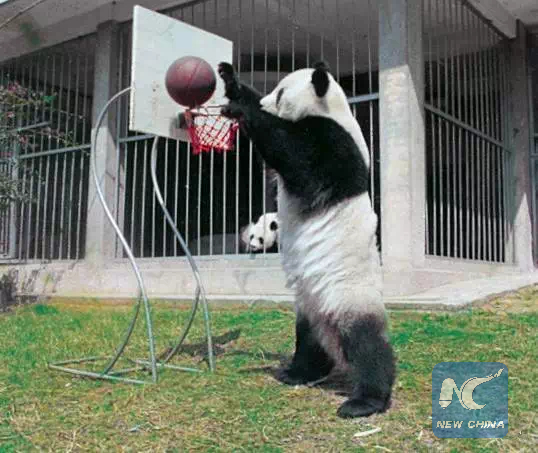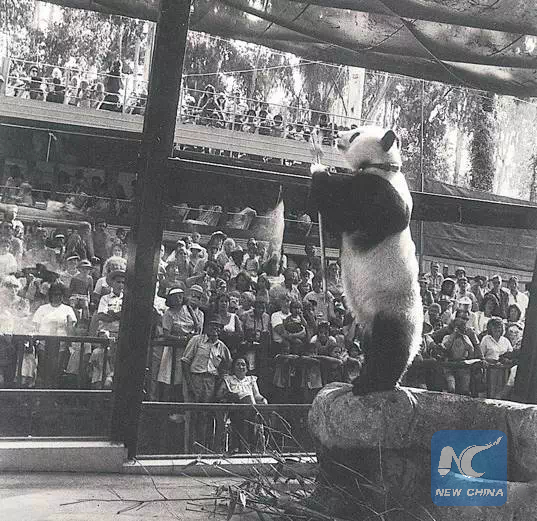
- Panda Basi. (Xinhua photo/Wei Peiquan)
Goodbye, Basi!
As the world's oldest captive panda, Basi was a legend. She has died at the age of 37, equivalent to more than 100 human years.
Basi died Wednesday morning at the Strait Panda Research and Exchange Center in Fuzhou City, east China's Fujian Province. She died of multiple illnesses, including liver cirrhosis and renal failure.
Basi celebrated her 37th birthday in January and was confirmed as the world's oldest living captive panda by the Guinness World Records. Basi became ill in June, and doctors had since tried every means to help prolong her life.

- Basi enjoyed her birthday cake. (Xinhua photo/Wei Peiquan)

- Basi was confirmed as the world's oldest living captive panda by the Guinness World Records. (Xinhua photo/Wei Peiquan)
As one of the most popular panda stars in China, and the model for the mascot of the Beijing 1990 Asian Games, Basi is a household name. Her life was full of unforgettable moments.

- Basi played with a wooden tube in May, 1984. (File photo)
Basi was born in the wild in 1980. At the age of four, she fell into the icy Basi Gorge and was rescued by local villagers in Baoxing County, southwest China's Sichuan Province. People named her after the gorge and sent her to Fuzhou, where she has lived ever since.

- Farmer Li Xingyu (R) was awarded for saving Basi from the icy river in 1984. (File photo)
Talented Basi soon learned and liked weight-lifting, riding a bicycle and playing basketball.


(File photo)
In 1987, Basi was invited by the U.S. San Diego Zoo for shows. She attracted around 2.5 million visitors during her six-month stay in the U.S. and amazed them with her acrobatic performances. The visitors were so many that they had to stand in line for over five hours before watching her for merely three minutes. She was honored as the "Stunt Panda" and "Friendly Envoy".


(File photo)
In 1990, Basi was chosen as the model for Pan Pan, the mascot of the Beijing Asian Games.

- Pan Pan, the mascot of the Beijing Asian Games.

- Basi stood on the podium.
In 1991, Basi was invited to the Spring Festival Gala staged by the China Central Television, a must-watch show for Chinese in their most important festival.

- Basi in the Spring Festival Gala. (File photo)
Basi not only brought laughter to Chinese people but also helped China's science and medical research. She donated cells for cloning research in 1998.
Since 2000, Basi suffered from vascular rupture, acute enteritis accompanied with pancreatitis, and cataract. But she made it.

- Basi was examined in 2001. In 2000, Basi was diagnosed with high blood pressure, the first giant panda case in the world. (Xinhua file photo)

- In the summer of 2010, Basi suffered from acute enteritis accompanied with pancreatitis. She was once in critical condition but was rescued. (File photo)
Basi was also the first giant panda which received a successful cataract surgery.
She survived severe illness several times thanks to the care of her devoted keeper Shi Feining.

- Basi and her keeper Shi Feining. (Xinhua photo/Wei Peiquan)
Shi took good care of Basi for 27 years before she died aged 44 in 2016. She was dubbed "mother of Basi".
"And now Basi has gone for her mama in heaven," said a Chinese netizen.

- After recovering from her illness, Basi celebrated her 30th birthday in 2010. She was equivalent to 100 years old in human age. A grand birthday party was held for her. (Xinhua photo/Wei Peiquan)

- "Panda Mama" Shi Feining gave Basi a shower in the summer heat in July, 2011. (Xinhua photo/Wei Peiquan)
"Wish you well in the Panda Planet," said a post on Weibo, a Twitter-like service in China.
According to Chen Yucun, director of the Strait Panda Research and Exchange Center, Basi's body will be put in Basi Museum, which is being constructed for people to forever remember her.

